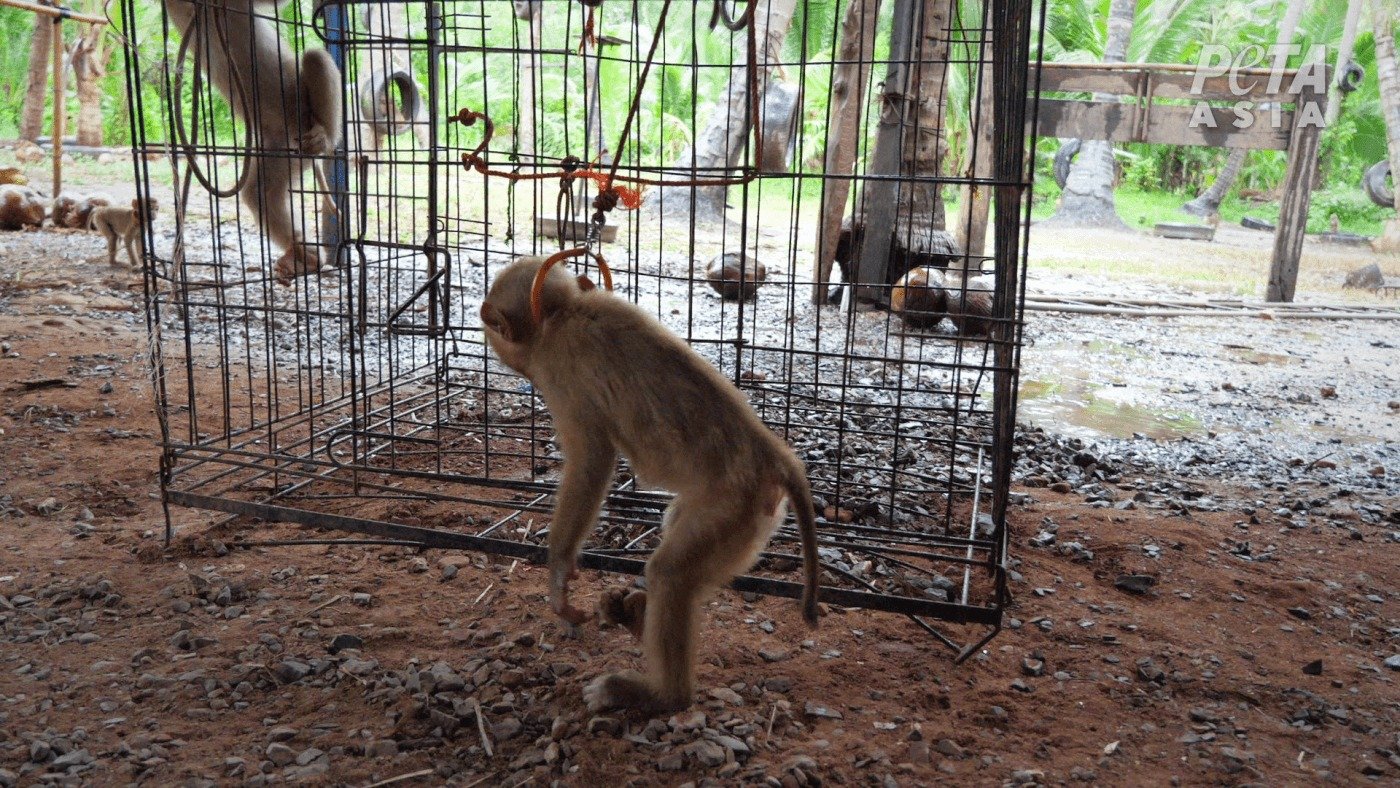Baby monkey abuse uncovered on Thai island where new season of The White Lotus is set
The show’s creator is calling on Thailand’s prime minister to end the use of forced monkey labor.
An older monkey, held in a small cage and chained around the neck, photographed during an undercover investigation into the coconut monkey industry. Credit: PETA Asia
The White Lotus creator Mike White is calling on Thailand’s prime minister to end the country’s use of monkeys to harvest coconuts.
Launched earlier this month, the show’s latest series is set on the idyllic Thai island of Koh Samui.
The island is known for its sandy beaches, blue seas, and luxury hotels. But it's also home to many so-called “coconut monkeys”, who can be seen being forced to work across the island. Koh Samui is part of the Surat Thani province, which is a known hotspot for the cruel practice.
As “coconut monkeys,” endangered pig-tailed macaques are forced into a lifetime of labor where the animals are kept on leashes and made to climb trees and harvest coconuts.
Monkeys used in the trade are either illegally abducted from the wild or bred on site at infamous monkey schools. As many as fifty monkeys can be kept at these schools, where baby monkeys are tethered by the neck on short ropes and unnaturally “trained” to learn how to harvest coconuts.
A recent undercover investigation that documented at some of these schools found that every single baby monkey observed was “suffering from physical discomfort, maternal and social deprivation, and psychological torment.”
With The White Lotus’ latest series bringing renewed attention to Koh Samui and Thailand, animal advocacy group PETA reached out to the show’s creator Mike White to share startling undercover footage of monkeys in the coconut industry.
Coconut monkeys are typically chained by their necks on short ropes. Credit: PETA Asia
Upon viewing the footage, White was compelled to speak out against forced monkey labor.
“I have just finished filming season three of The White Lotus on Samui. It’s a beautiful place, but I was shocked to learn from my friends at PETA that there and elsewhere in Thailand, monkeys are forced to work for the coconut industry,” White said in a letter addressed to Prime Minister Paetongtarn Shinawatra. “I urge you to end this exploitation of our fellow primates and ensure that Thailand’s entire coconut industry transitions to humane harvesting methods that don’t rely on forced monkey labor.”
In Thailand, it is currently legal for monkeys to be used in the coconut industry, and monkey schools are even promoted to tourists on the Thai government website, where the animals are forced to perform coconut-picking demonstrations for visitors.
Baby monkeys cling to each other at a Thai coconut-picking school in this image from PETA Asia’s investigative footage. Credit: PETA Asia
The country’s hugely profitable coconut industry has faced widespread international backlash over its use of monkeys, with major suppliers around the world dropping coconut milk products produced in Thailand.
Despite calls to make the practice of monkey labor illegal, the Thai government has instead focused on “monkey-free” certifications, which reportedly audit farms and accredit those that do not use monkeys. However, advocacy groups including PETA say such systems are “phony” and primarily rely on coconut producers’ word. PETA says “monkey-free” certifications have been offered to farms that have “proved” to still use monkey labor.
Not only is the practice still legal, but the industry’s use of monkeys offers little-to-no welfare for the animals.
In Koh Samui and across Thailand, coconut monkeys are typically denied comfort, enrichment, or adequate socialization. Many of them are tied to tiny cages or poles, and can often suffer painful chafing around the neck where they are tethered.
We Have A Favor To Ask…
Species Unite amplifies well-researched solutions to some of the most abusive animal industries operating today.
At this crucial moment, with worldwide momentum for change building, it’s vital we share these animal-free solutions with the world - and we need your help.
We’re a nonprofit, and so to keep sharing these solutions, we’re relying on you - with your support, we can continue our essential work in growing a powerful community of animal advocates this year.






